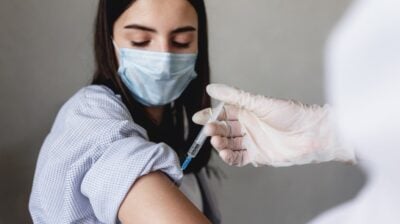What are the different phases of your menstrual cycle?
Get a better understanding of what happens each week during your menstrual cycle.

The menstrual cycle is a chain of activities in the brain, ovaries, and uterus/womb linked to hormones that send signals through the blood from one part of the body to another. It is the time from the first day of a person’s period to the day before their next period (around 28 days long). In this article, we explain what are the different phases of your menstrual cycle, and what happens during each phase.
This cycle can be split up into four phases across four weeks; the menstrual phase, the follicular phase, ovulation and the luteal phase. This cycle happens every 28 days or so, but it’s common for cycles to be longer or shorter than this. They can range from every 23 days to every 35 days. During this time you may experience a variety of different symptoms and moods depending on what stage of your cycle you are in. Tracking your cycle can give you a better understanding of how long your cycle is and how you feel during certain times of the month.
What are the phases of your menstrual cycle?
This article will talk about oestrogen and progesterone, the main hormones produced by the ovaries in the female reproductive system. Both are important hormones in the menstrual cycle. Oestrogen production influences the first half of the menstrual cycle before ovulation. Progesterone production peaks during the second half of the menstrual cycle. Both hormones are important in preparing the lining of the womb for possible pregnancy and the implantation of a fertilised egg. They can also influence your mood and other symptoms you may experience during your cycle.
The menstrual phase (Week 1)
The menstrual phase is the first phase of your menstrual cycle and can last about seven days. The stage of the cycle is known as your period. During the menstrual phase, your hormones change as oestrogen and progesterone drop.
Oestrogen and progesterone cause the lining of your uterus to shed, and this fluid is what you bleed through your vagina when you have your period. The uterus sheds its lining if pregnancy has not occurred. The length of a period varies from person to person. If you are concerned about the length, heaviness or frequency of your period, especially if any of these have recently changed, it can help to speak to a professional about this. Visiting your GP or a women’s health clinic can be the best way to deal with concerns about your period.
Aside from bleeding, you may experience other symptoms during your period such as:
- Cramps
- Bloating
- Tender breasts/chest
- Acne breakouts
- Mood changes
Everyone experiences their period differently. Because of this, it can often be difficult to know if the symptoms you are experiencing are more intense or difficult than they should be. Period pain or heavy flow (a lot of blood loss) that stops you from being able to go to school or work can be a sign that something is wrong. If you have concerns about your period, it is best to speak to a professional about it.
The follicular phase of your menstrual cycle (Week 1-2)
The follicular phase of your menstrual cycle overlaps with menstruation since it begins on the first day of your period and lasts between 10 to 16 days.
During this phase, your body releases Follicle-Stimulating Hormone (FSH). FSH triggers your ovaries to create follicles, sacs containing immature eggs. Around 10 follicles will grow and compete to release an egg. The follicle that is the strongest will get to grow and eventually contain a mature egg capable of fertilisation. Your body will reabsorb the other follicles. FSH causes oestrogen to rise.
Since the follicular phase overlaps with menstruation, the symptoms you experience around this time, such as cramps and bloating, are related to your period and not the follicles growing.
Ovulation (Week 3)
A female baby is born with all the eggs they will ever have. This is estimated to be around two million, but by puberty, this number has decreased to about 400,000. From puberty to menopause, only about 300 – 400 eggs will be released through ovulation.
Ovulation happens around day 14 of your cycle or about a week after the last day of your period. During ovulation, one ovary will (usually) release a single egg. The egg will travel from the ovary down into the fallopian tube, where it can potentially be fertilised by sperm. This phase of your menstrual cycle is when you are most likely to get pregnant.
Ovulation lasts for 12-24 hours. However, there is a 3-to-5-day window around ovulation where you’re most likely to get pregnant. That’s because sperm can live inside your body for up to five days, waiting for a mature egg to pass by. You are also never certain what day you will ovulate. It is extremely important that if you are not trying to get pregnant you always use protection and/or contraception if having sex with someone with a penis.
The hormones that control your menstrual cycle also make your cervix produce mucus that comes out of your vagina as discharge. Your cervical mucus changes in colour, texture, and amount during your menstrual cycle, especially around ovulation.
During ovulation, you may experience changes such as:
- Clear, slippery discharge similar to a raw egg white
- Mittelschmerz, or pain on one side depending on which ovary releases the egg. The pain can be dull, achy, or sharp.
- Increased sex drive
- Increased feelings of confidence and happiness
If you feel that something may be wrong, speak to your GP or a gynaecological health professional about any concerns. Sometimes you may be referred to a hospital or community clinic to meet a gynaecology nurse or doctor if you need more support.
The luteal phase of your menstrual cycle (Week 3-4)
The luteal phase is the last phase of the menstrual cycle and typically lasts for 14 days.
During this time, the remainder of the dominant follicle turns into the corpus luteum, which is a mass of cells that makes the hormone progesterone, the second main female hormone mentioned earlier. Progesterone thickens the uterine lining, preparing the body for pregnancy if the egg is fertilised.
Since this phase of your menstrual cycle leads up to your period, you may experience premenstrual syndrome (PMS) around day 12 of the luteal phase. PMS is the name for the symptoms people can experience in the weeks before their period. Symptoms of PMS can include feeling upset, anxious or irritable, bloating or tummy pain and changes in appetite and sex drive. It is believed that a change in hormones during your cycle causes PMS.
Not everyone will experience the same symptoms in the days leading up to their period. Your cycle begins again on the first day of your period. At this time you enter the menstrual phase once again.
Feeling overwhelmed and want to talk to someone?
- Get anonymous support 24/7 with our text message support service
- Connect with a trained volunteer who will listen to you, and help you to move forward feeling better
- Whatsapp us now or free-text SPUNOUT to 50808 to begin.
- Find out more about our text message support service
If you are a customer of the 48 or An Post network or cannot get through using the ‘50808’ short code please text HELLO to 086 1800 280 (standard message rates may apply). Some smaller networks do not support short codes like ‘50808’.






